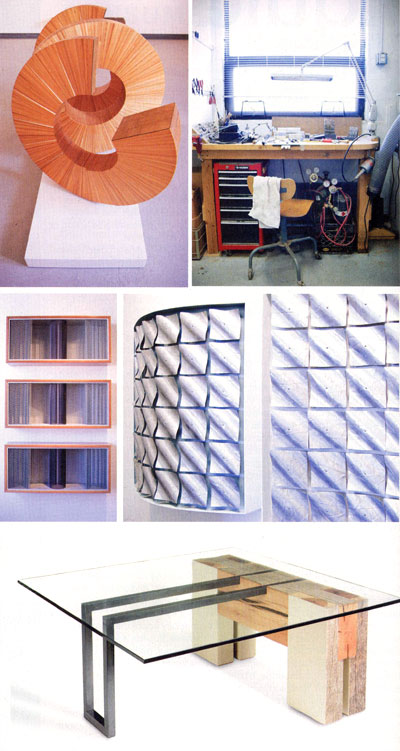 |
A Study in Contrast: Jacob Kulin’s Creations |
 Jacob Kulin, furniture maker and sculptor, presides over a studio space tucked in a remote corner of Southie. His workspace is quiet; he is not. An intense 37-year-old with twinkling eyes and a friendly canine sidekick, Kulin has the wardrobe of a lumberjack and the heart of an entrepreneur. This is a man who's designed mounted wall sculptures for billionaires in Dubai and cruise lines in the Caribbean, but who will also beat down barn doors in rural Pennsylvania to purloin just the right wood.
Jacob Kulin, furniture maker and sculptor, presides over a studio space tucked in a remote corner of Southie. His workspace is quiet; he is not. An intense 37-year-old with twinkling eyes and a friendly canine sidekick, Kulin has the wardrobe of a lumberjack and the heart of an entrepreneur. This is a man who's designed mounted wall sculptures for billionaires in Dubai and cruise lines in the Caribbean, but who will also beat down barn doors in rural Pennsylvania to purloin just the right wood.
His creations at Kulin Modern embrace such seamless conflict: some stools and tables, for instance, pit hard-edged metal and glass against the softness of reclaimed oak. Inspired by his family's Scandinavian heritage, Kulin favors modern lines mixed with warm wood patinas. And please banish any thoughts of IKEA from your mind: instead think reclaimed oak balancing translucent glass, warm black walnut elevating small aluminum shelves.
Kulin got his start working with jewelry and small metals, and he considers his large-scale work an extension of this background. "I'm creating large jewelry in the shape of sculpture, on an architectural level," he enthuses. "The person who likes clean, slick, modern lines, somebody who likes mixing classical with modern elements, will appreciate my work," he says. "The reclaimed essence speaks to certain people. I'm trying to use edgy materials and edgy forms, curved compositions. When asymmetry and symmetry collide - it's organized chaos."
To this end, Kulin strives to wed sleek elements of metal and glass with the unpredictability of nature. This is a man who is truly passionate about wood. He often journeys to Amish country in the wilds of rural Pennsylvania, where he was raised, to unearth usable materials. He bounds down the hall to his personal workshop, gesticulating wildly, talking about a recent piece of salvaged wood that he transformed from a barn door into a bench. "I really think the fact it's reclaimed is important. It's being recycled, reused. It has more character, bar none, than any new material I could get, so it's win-win. I love the old patina, the history." His eyes light up, and he stares at me intently: "This barn was built well over 150 years ago, and this tree was probably growing for 150 years before that. You're looking at a bench in 2009 that really started its life in the 1700s. It grew for 150 years!"
Despite his love of nature and his earthy demeanor, Kulin's scope is global and his focus is on the future. He's been commissioned by Wellington Management Company, AstraZeneca, and money-is-no-object collectors in the Middle East. Here in Boston, he was represented by the Judi Rotenberg Gallery before striking out on his own. These days, he's a one-man show: "I'm the designer, photographer, website designer. I have to be able to articulate my work. I have to walk the walk and talk the talk."
He thinks Boston is a more challenging city to do that in than, say, New York, where people are more willing to drop big bucks on artwork. But he's gotten a warm reception in Boston since arriving in 2000, after training at Skidmore College and the Cranbrook Academy of Art. "There's a different kind of temperament here. This is a manageable city. I feel kind of like part of my mission is to bring my energy and my love of what I do to the people here in Boston. Look! I'm right here, surrounded by the ICA, the Boston Design Center, the South End. I'd love to know somebody like me, if I were a designer," he says with a smile.
by Kara Baskin | January 11, 2010